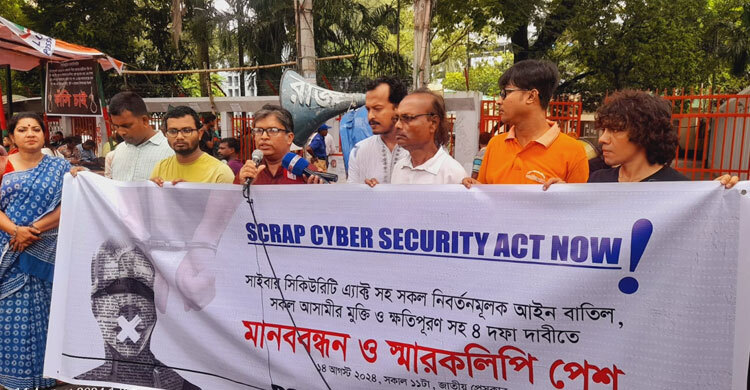DSA Victims Network demands repeal of all restrictive laws

The DSA Victims Network, an organisation representing victims of state-sponsored oppression under laws such as the Digital Security Act (DSA), Cyber Security Act, and ICT Act, has called for the repeal of all restrictive laws in Bangladesh.
The group, which formed a human chain at the National Press Club on Wednesday, emphasised the need for complete abolition, rather than reform, of the Cyber Security Act, which they describe as a tool of repression following the popular uprising.
Speakers at the event asserted that merely reforming these laws would not restore public trust, as they are seen as instruments of dictatorship. They argued that even if a new law is necessary, the spirit of the current popular movement demands that these oppressive laws be entirely dismantled, said a press release.
The DSA Victims Network's four-point demand includes: Repealing all restrictive laws, including the Cyber Security Act, declaring all cases filed under the Digital Security Act, Cyber Security Act, and ICT Act null and void, with compensation for the accused, taking legal action against government agencies or individuals who filed false cases using these laws, reforming the unilateral power structure of the government that allows it to enact laws without public input.
The event was chaired by DSA Victims Network Convener Ghulam Mahfuz Joardar and moderated by Didarul Bhuiyan. Victims who spoke included Khadijatul Kubra, Israt Jahan Reilly, Ehsan Habib, Alamin Sheikh, Shamim Ashraf, and Sadhana Mahal. Other speakers included Mahmudur Rahman Manna, president of Nagarik Oikya, Shirin Haque of the women's side, Nasrin Jahan Smriti of the Mother's Call, Dr. Sabrina, poet Sarkar Aziz, Abul Kalam Al Azad, poet Saeed Islam, poet Arafat Rilke, and Professor AKM Shamsuddin Chowdhury.
Later, they submitted a memorandum to the interim government’s adviser for law, justice and parliamentary affairs ministry.

